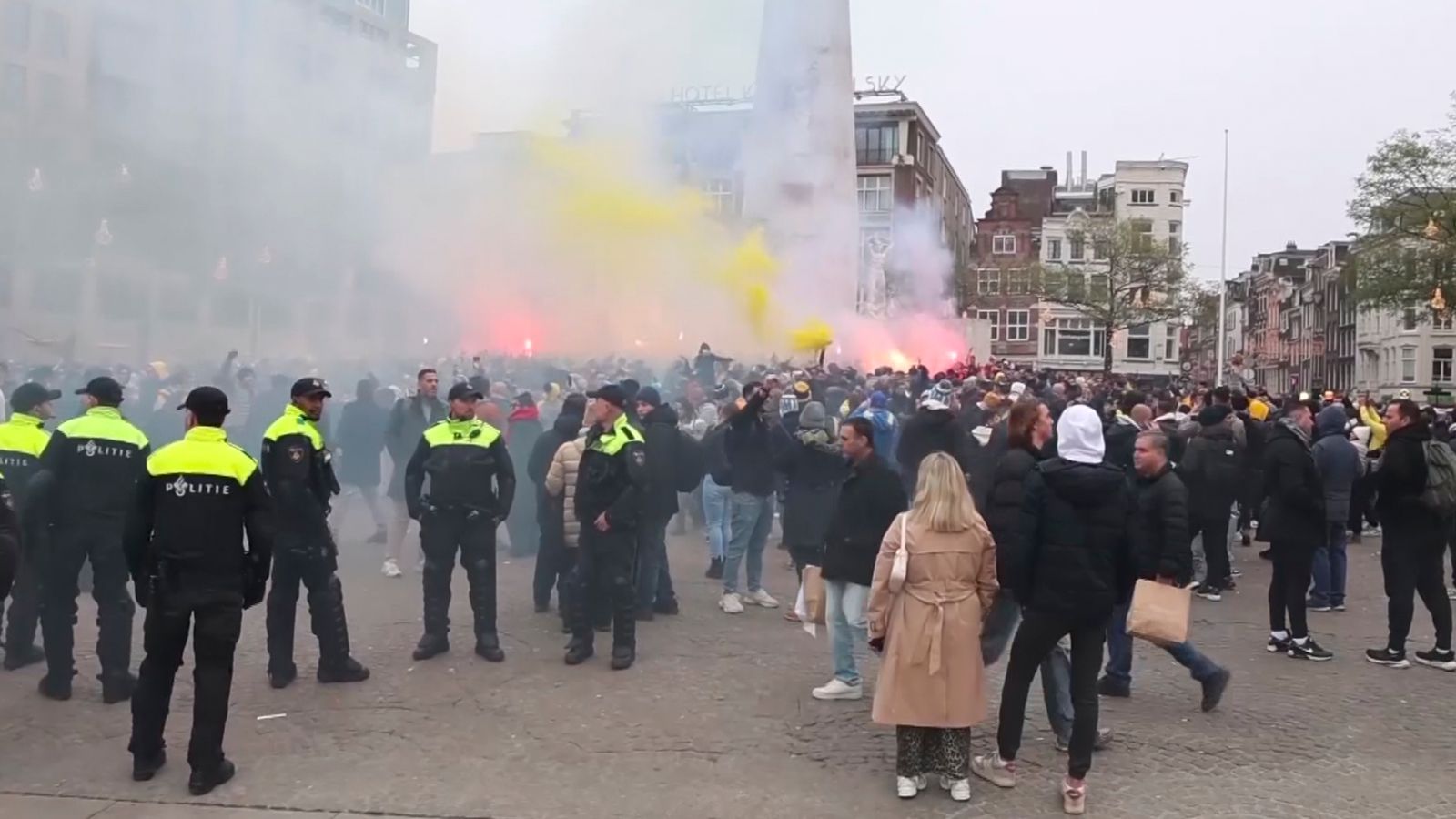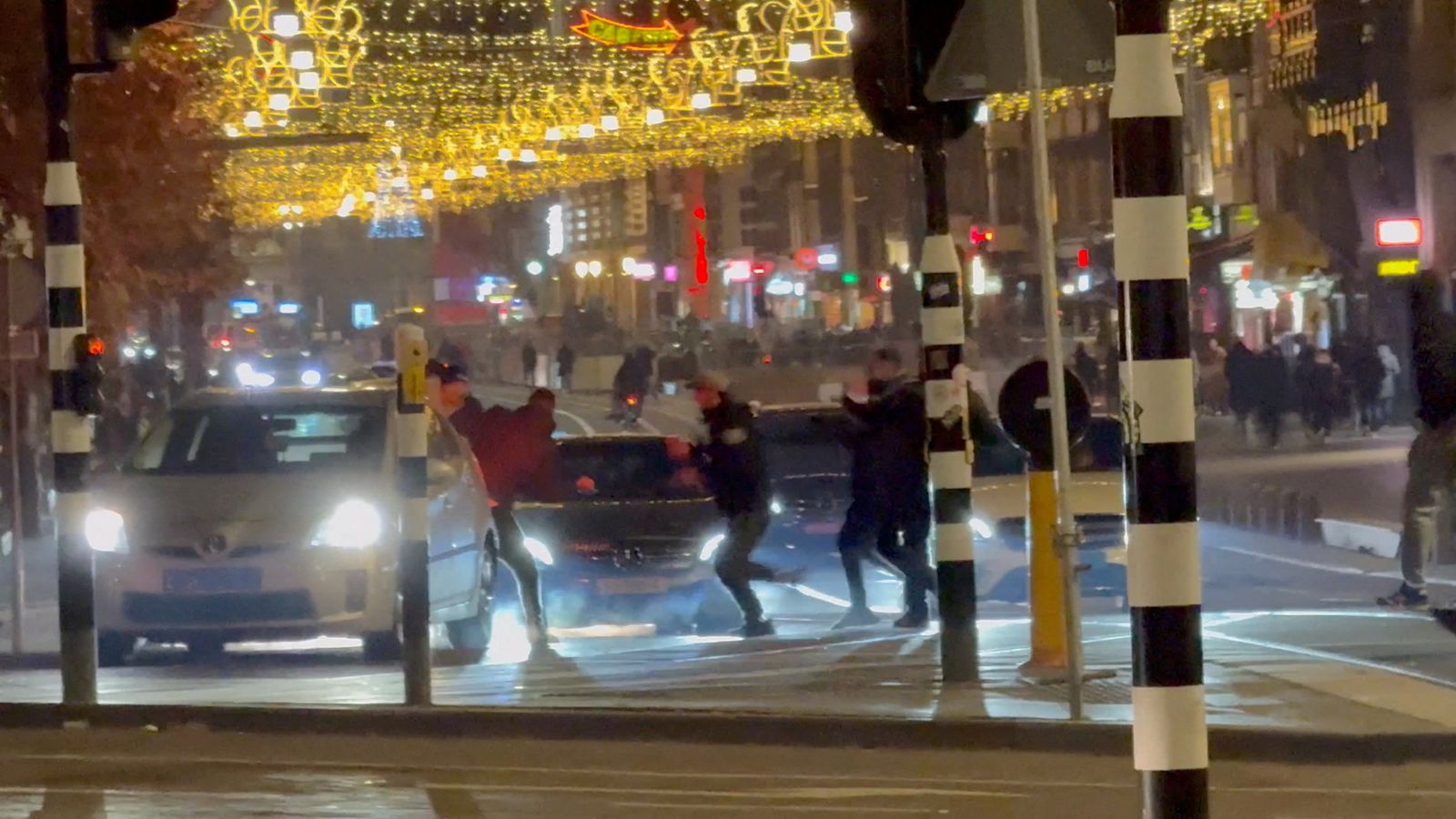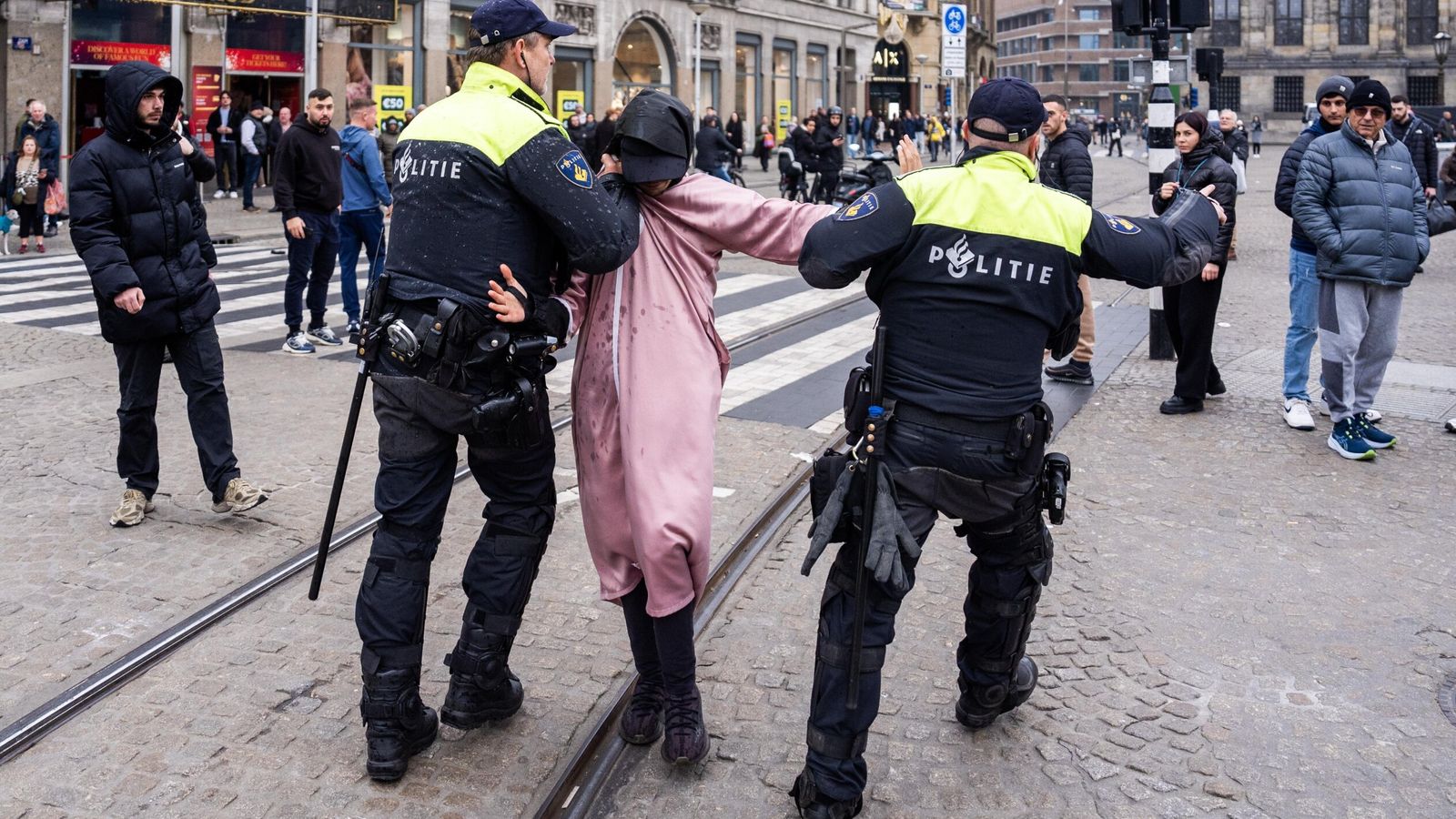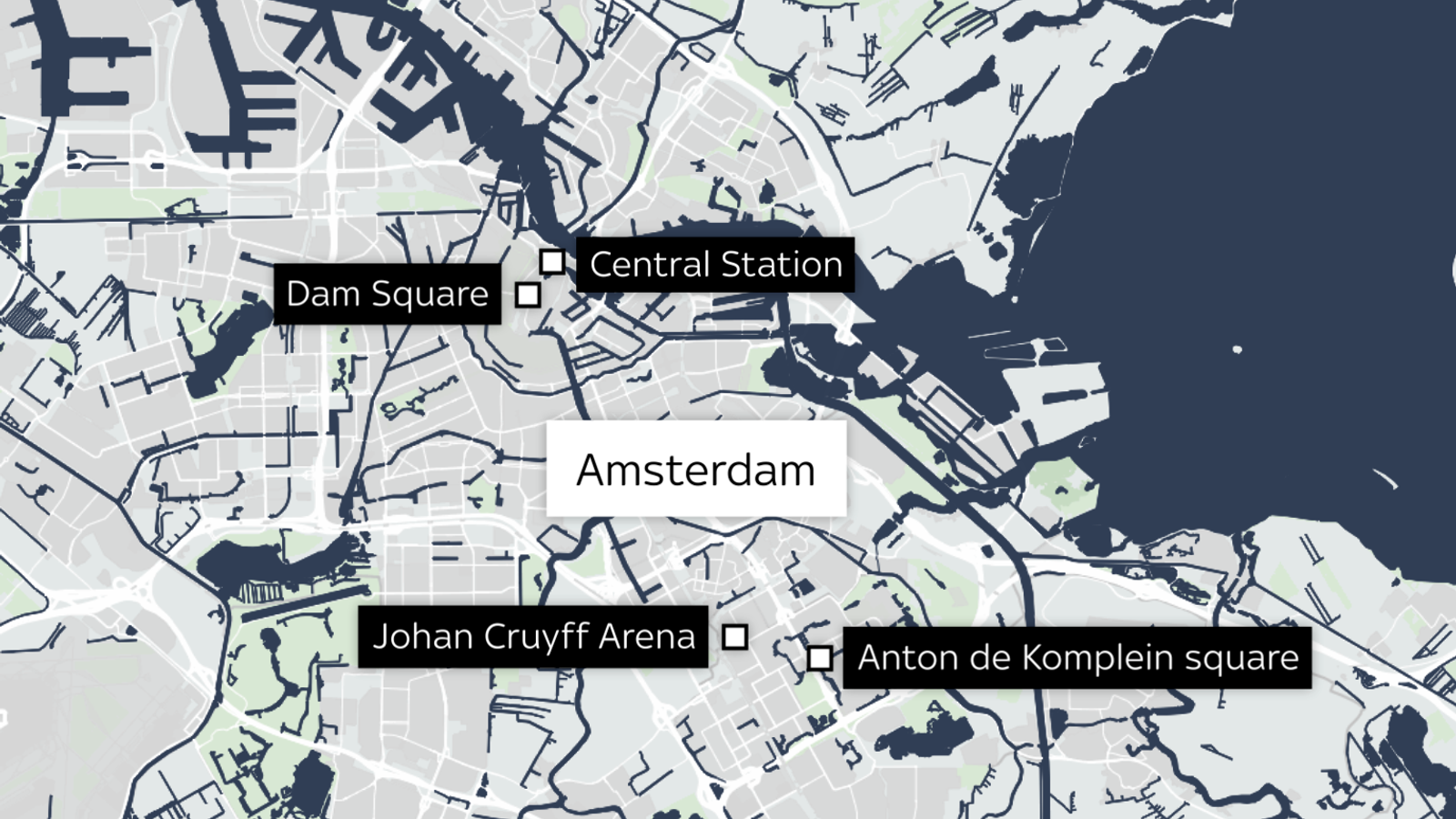In an unprecedented response to escalating violence, Amsterdam Mayor Femke Halsema has announced stringent emergency measures following what she described as “a very dark moment” for the city.
These actions come in the wake of attacks on Israeli football supporters in the Dutch capital, which saw numerous individuals assaulted, buildings vandalized, and multiple arrests.
The violence unfolded after Israeli fans of Maccabi Tel Aviv removed Palestinian flags in central Amsterdam, leading to intense confrontations with rioters that the mayor has condemned as “antisemitic criminals.”
Reflecting on the situation, Halsema expressed her dismay, stating, “I am deeply ashamed. Antisemitic criminals attacked and assaulted visitors to our city, in hit-and-run actions.”
The incidents mark an alarming shift in Amsterdam’s security situation, as historically peaceful demonstrations have now devolved into violent clashes with international implications. In response, authorities have introduced sweeping emergency powers throughout Amsterdam and the Amstelveen suburb, a region south of the capital.
The emergency measures include an outright ban on protests and face coverings, alongside expanded police authority to conduct random searches. High-risk buildings are now under heightened protection, an indication of the city’s urgency to prevent further violence.

Timeline of the Violence
The violence erupted shortly before Maccabi Tel Aviv played against Ajax at the Johan Cruyff Arena, a match that ended with Ajax winning 5-0. Prior to the game, a video surfaced on social media showing Maccabi Tel Aviv supporters tearing down Palestinian flags in central Amsterdam.
The act triggered a swift and violent response, with large groups of rioters attacking Israeli fans in what police described as organized, “hit-and-run” assaults.
The intensity of the altercations was apparent as emergency services responded to numerous incidents across the city, with Israeli supporters requiring police escorts for safety.
Local authorities confirmed that five individuals had to be hospitalized, although all were discharged later, and 62 arrests were made. Among those detained, 10 remain in custody, including two minors.
Reports from social media and witness accounts depict chaotic scenes, with mobs running through the streets and at least one individual beaten in the fray.
In a series of confrontations, police were forced to repeatedly intervene, assisting Israeli fans in reaching hotels and other safe locations.

Statements from Authorities
The morning following the violence, Amsterdam police and prosecutors issued a joint statement addressing the turmoil that had spread through the city overnight.
Describing the evening as “very turbulent with several incidents of violence aimed at Maccabi supporters,” the statement condemned the actions of rioters, asserting that “there is no excuse for the antisemitic behavior exhibited last night.”
Mayor Halsema emphasized her resolve to restore order and ensure safety, denouncing the rioters’ actions as an “outburst of violence toward Israeli supporters” that has no place in Amsterdam.
Safety Concerns and Security Measures
The violence has prompted intense scrutiny of Amsterdam’s ability to protect its residents and visitors in politically charged situations.
Amid reports of a possible hostage situation, which police later clarified was unverified, authorities have been conducting a rigorous search for any potential victims or people reported missing.
Fortunately, those previously unaccounted for were located, alleviating initial fears of more severe consequences.
In a statement issued by Israeli authorities, there were initial plans to dispatch military aircraft to evacuate Maccabi supporters, though this was later scaled back in favor of sending two commercial flights.
This rapid shift underscores the urgency and concern surrounding the volatile environment for Israeli nationals in Amsterdam.

Protests and Riots
As tensions mounted, pro-Palestinian demonstrations in Amsterdam took a confrontational turn.
The city’s authorities had previously barred a pro-Palestinian rally from convening near the Johan Cruyff Arena, rerouting it instead to the Anton de Komplein square.
Despite these restrictions, parts of the crowd attempted to reach the stadium. Riot police intervened as demonstrators attempted to advance, some of whom hurled fireworks at law enforcement officers.
In the end, around 30 people were arrested in connection with these disturbances, most charged with public disorder or possession of fireworks.
The volatile atmosphere inside the stadium remained largely contained during the game. Fans were able to exit the arena without further incidents, but renewed clashes erupted across the city center later in the evening.
Reports of scattered violence persisted into the night, exacerbating fears that the city’s current security measures might not be enough to deter future confrontations.

Reactions and Broader Implications
The unrest in Amsterdam is reflective of the increasingly complex intersection between sports, politics, and ethnic tensions across Europe.
For Amsterdam, a city historically known for its openness and tolerance, the violent outbreaks represent a stark departure from its typical social fabric. Mayor Halsema’s remarks reflect the broader sense of dismay felt by city officials and residents alike.
“This is not the Amsterdam we want to be known for,” she said.
City officials are now tasked with the difficult balance of upholding public safety while preserving Amsterdam’s identity as a safe and welcoming destination.
The measures announced thus far, which include stringent limits on public gatherings and increased police powers, signal a cautious yet decisive response to an unprecedented level of unrest.
The recent incidents have underscored the need for a more robust security framework that can quickly adapt to unforeseen conflicts involving international visitors. Amsterdam’s latest emergency measures highlight the extent of official concern, but questions remain about the city’s long-term strategy to address the root causes of such violence.
Security experts and city officials are evaluating whether Amsterdam’s current policing strategies are sufficient for managing politically sensitive events, particularly those involving international and inter-ethnic disputes. The broader implications of the conflict suggest that city leaders may need to consider more preventive measures to avoid similar incidents in the future.



